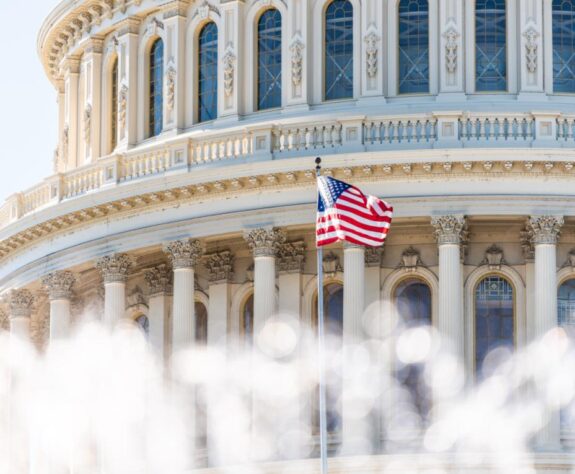Strengthening Governance

Following the house resolution on a Green New Deal, policy experts, politicians, and thinktanks around the country have been inspired to contribute their own vision for a national climate plan. The Kleinman Center wants to ensure that we too are offering our vision for a successful national response to the global climate crisis. The below is one of six policy efforts that we see as essential elements of an effective climate plan. View the full list here.
The other five elements of this climate action plan will not be possible without robust and judicious governance at the federal, state, and local level. Today in the US, partisanship, corporate lobbying efforts, the spread of misinformation, and a lack of political engagement have completely stalled any meaningful legislative action on climate change. This inaction and division not only threatens an effective global response to the climate crisis, but also severely increases the United States social, economic, and security vulnerability to future climate, market, and geopolitical conditions.
Some states such as California are attempting to respond ambitiously to the threat of climate change at the state level, but without a supportive – or at the very least non-obstructive – federal government, these efforts will be needlessly diminished and delayed. Only by reforming our federal governance practices will a successful response to climate change – both domestically and internationally – be made possible. The fossil fuel industry’s contributions to political campaigns and climate lobbying efforts have skyrocketed in recent years, and the only way this will change is via legislative action to restructure campaign finance and lobbying laws. While private interests should have a way of making their voices heard in policy discussions, the influence of money in US governance has reached a point where it fundamentally threatens democracy and the government’s ability to make decisions for the good of the American people. Furthermore, there is a misguided narrative present in federal discussions on climate change that asserts climate action will negatively impact the US economy and our economic standing internationally. Nothing could be farther from the truth. Our delay in embracing the energy transition has allowed other countries, particularly China, to gain a significant head start in clean energy R&D, patents, and manufacturing as well as infrastructure improvements to accommodate these new energy sources. Further delaying US action on climate change will leave us behind as the rest of the world builds the economy of the future.
The only individuals in this country who stand to gain in the long-term from delayed action on climate change are those who have high-level financial attachments to carbon producing industries. Unfortunately, because of the rise of increasingly partisan dialogue and misinformation, and the lack of compromise and common goal setting, a large portion of the country’s voters continue to see the necessary transition away from carbon emissions as a threat to their livelihood and way of life rather than the only realistic way to preserve them. This, in turn, places ill-fated pressure on politicians to act only in the short-term interests of their constituents.
Finally, the United States’ ability to respond to climate change has been diminished by our recent loss of international standing. The US administration for the last several years has taken a number of steps to weaken our influence around the globe, including pulling out of international trade and environmental agreements, adopting a hands-off approach to growing anti-democratic sentiment, and threatening long-standing alliances. These geopolitical decisions, especially the decision to withdraw from the Paris Climate Agreement have severely reduced our government’s ability to play a significant leadership role in tackling the climate crisis. Without the United States involved, global efforts to prevent ecosystem destruction, protect vulnerable populations, and incentivize decarbonization will be far less effective and the world’s chances of preventing a run-away greenhouse effect will be significantly diminished.
Oscar Serpell
Deputy DirectorOscar Serpell oversees all student programming, alumni engagement, faculty and student grants, and visiting scholars. He is also a researcher, writer, and policy analyst working on research initiatives with students and Center partners.
